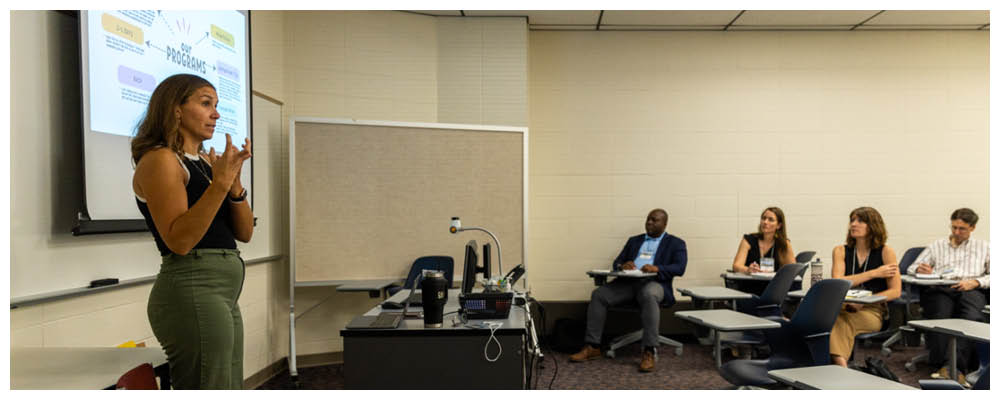Note that most of the information on this page is for interactive workshops. Sometimes the vocation workshop program is used for a large group speech instead. In that case, the notes about flow and various activities to integrate may not be relevant.
Conversation with Institution about Workshop
Beyond the general items listed on the home page, here are some additional things you may want to discuss in your planning conversation with the institution:
- Specific goals for the workshop.
- Who will attend the workshop? Will it be faculty only or faculty and staff? How often do the people who will be present collaborate with each other?
- How will attendees be recruited? Would it be helpful if we provided some language or materials for advertising the opportunity?
- What will the workshop space look like?
- Are there any other conversations or one-on-one meetings that it would be helpful for me to have while I am on campus?
General Flow of a Workshop
Even though the length of each workshop may vary, there is a common flow through a workshop that may be useful to consider. You can vary the amount of time you spend on each portion of the workshop, but we strongly recommend that you make sure to dedicate enough time to discussion and planning time for participants. A significant part of the value this workshop offers to the campus is the opportunity to connect with each other in new ways and be in conversation about the implications of the presented topic for their work on campus.
1. Moment of Connection and Community Building (something active)
Open the workshop with an activity that invites participation and sharing. You have an opportunity to encourage participants to connect with or get to know each other in a new way. There are some examples below of more extended activities you could do with them if there is time. This could also be as simple though as asking as question and having them share out their answer with a couple of nearby colleagues:
- Why are you at <institution name> right now?
- What gives you hope in your teaching or work with students?
2. Common Language and New Content
Introduce the content for the topic of the workshop. It is generally a good idea to include a broad introduction (or refresher of) vocation. Even if an institution is well established in its work on vocation, it is still likely that there are individuals in the room that are less familiar with the concept.
3. Connecting to the Work of the Institution
It is helpful to commit at least a couple of minutes to allowing participants to reflect on the connections between what you shared and their work at the institution (or the mission of the institution generally). This signals that you are honoring their expertise and relying on them to contextualize the concept to the particularities of their campus.
4. Examples and Considerations for Successful Implementation
It is often helpful to present some examples of what the concept you are discussing could look like in action. Consider providing a range of examples from very simple/straightforward to more extended or complex. Including simple or straightforward examples helps to allay participants fears about the amount of time or effort that is required to start including vocational discernment in their work with students. Be sure to tell participants that these are examples that are meant to spark their own thinking, not necessarily recommendations of exactly what they should implement.
5. Discussion and Planning
Create space for participants to reflect, discuss with one another, and share with the larger group. Some general prompts that you may find helpful:
- Did those examples prompt any new thinking for you?
- Is there anything of interest you want to explore more?
- What would it take for the projects or programs I presented to be effective on your campus?
- What kinds of activities do you think will work well with your students?
6. Closing Encouragement
Encourage participants to choose one actionable item that can bring them a step in the right direction. It is easy to make plans for big changes or a develop a big vision for integrating vocational discernment. While that is good and can be supported by grant periods over a longer period of time, it is also helpful to reassure people that that piloting small changes can still yield worthwhile conversations and results with students.
Resources for Developing Your Workshop
Longer Opening Activities
Introducing the Language of Vocation
These slides offer various definitions of vocation to participants to discuss. You could present them and ask what they notice in common about them or what language might resonate with their students.
Another slide presents a variety of words and phrases that campuses use to talk about vocation. You may find this slide useful if the institution you are working with is still discerning how they might want to talk about vocation among themselves and with their students.
Topic Specific Resources
If you are leading a workshop on vocation in the major or in advising, you may find the resources below helpful. We also recommend that you browse the Vocation Matters blog for additional examples and ideas.
Vocation in the Major
Vocation in Advising
Vocation in the First Year Experience
If you are leading a workshop or consultation that includes discussions of vocation in the first year, please take time to review these recommendations about what does and does not work well in a first year program. We also recommend that you browse the Vocation Matters blog for examples and ideas of what institutions have tried in the first year.

The materials on this site have been curated by NetVUE to support NetVUE consultations and workshops. Please consult with Rachael Baker (rbaker@cic.edu) before sharing the resources outside the network.









